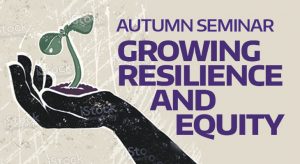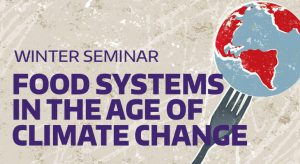Food Systems, Nutrition, and Health Seminar
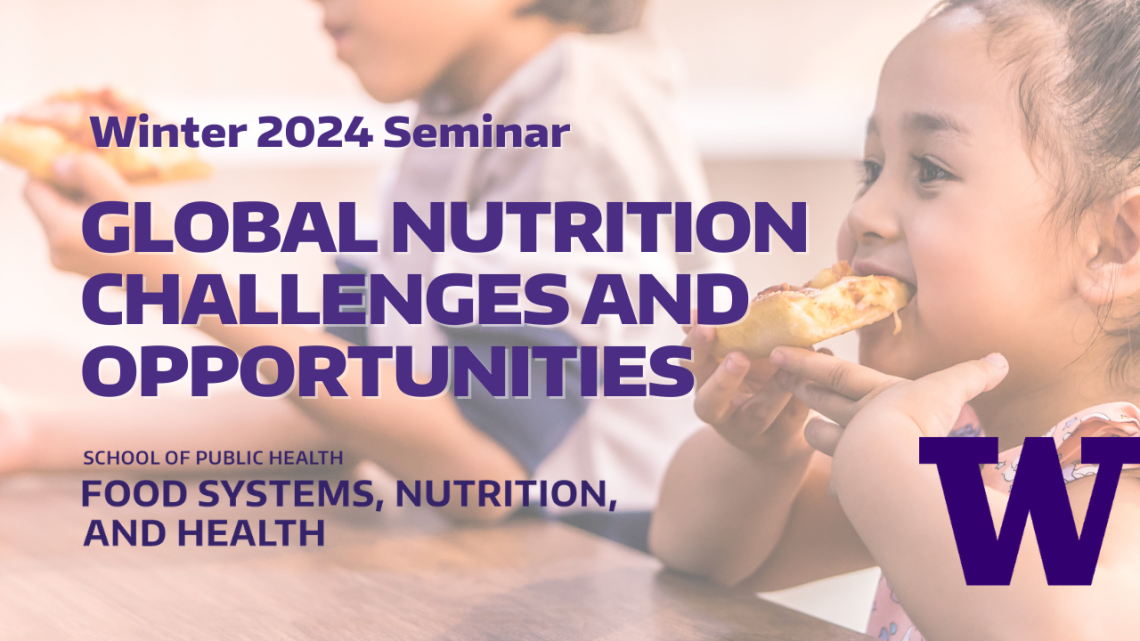
Global Nutrition Challenges and Opportunities
Winter quarter 2024
Tuesdays at 12:30 p.m. in Kane Hall 120
Instructor: Adam Drewnowski
Register for:
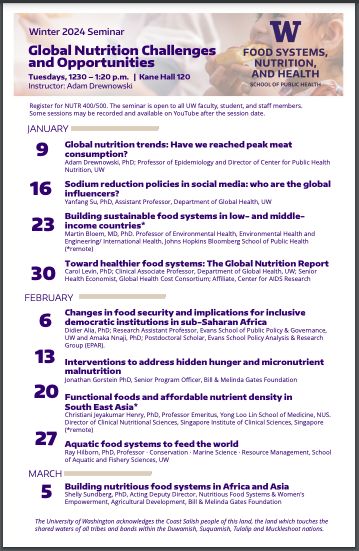
Every country in the world is facing some nutrition-related challenge. Malnutrition can take many forms from undernutrition, childhood wasting and stunting to hidden hunger and rising rates of adult and child overweight. Many global diets, including those of higher income countries, continue to be deficient in priority micronutrients iron, zinc, calcium, folate, iodine and vitamin A. Is fortification the answer? There are further concerns about protein quality and protein sources and the future of alternative proteins from plants. Building sustainable healthy diets for low- and middle-income countries is a particular challenge. The four dimensions of sustainable nutrition are health, economics, society and the environment. Global food systems need to produce food that are nutrient rich, affordable, socially acceptable across geographies, and environmentally friendly. What is the role of livestock, fisheries, food science, and the food industry in providing the world with the foods we need?
Guest speakers in this series are at the forefront of global initiatives aiming to reduce undernutrition and build sustainable, healthy food systems worldwide.
All UW students, faculty, staff are welcome to attend the seminar.
Weekly Schedule
Session recordings, when available, are linked from the session title. Sessions with an asterisk (*) will be presented via Zoom. Printable speaker schedule (pdf)
| Date | Title |
|---|---|
| Jan 9 | Global nutrition trends: Have we reached peak meat consumption? Adam Drewnowski, PhD; Professor of Epidemiology and Director of Center for Public Health Nutrition, UW |
| Jan 16 | Sodium reduction policies in social media: who are the global influencers? Yanfang Su, PhD, Assistant Professor, Department of Global Health, UW |
| Jan 23 | Building sustainable food systems in low- and middle-income countries* Martin Bloem, MD, PhD. Professor of Environmental Health, Environmental Health and Engineering/ International Health, Johns Hopkins Bloomberg School of Public Health (*remote) |
| Jan 30 | Toward healthier food systems:The Global Nutrition Report Carol Levin, PhD; Clinical Associate Professor, Department of Global Health, UW; Senior Health Economist, Global Health Cost Consortium; Affiliate, Center for AIDS Research |
| Feb 6 | Changes in food security and implications for inclusive democratic institutions in sub-Saharan Africa Didier Alia, PhD; Research Assistant Professor, Evans School of Public Policy & Governance, UW and Amaka Nnaji, PhD; Postdoctoral Scholar, Evans School Policy Analysis & Research Group (EPAR). |
| Feb 13 | Interventions to address hidden hunger and micronutrient malnutrition Jonathan Gorstein PhD, Senior Program Officer, Bill & Melinda Gates Foundation |
| Feb 20 | Functional foods and affordable nutrient density in South East Asia* Christiani Jeyakumar Henry, PhD, Professor Emeritus, Yong Loo Lin School of Medicine, NUS. Director of Clinical Nutritional Sciences, Singapore Institute of Clinical Sciences, Singapore (*remote) |
| Feb 27 | Aquatic food systems to feed the world Ray Hilborn, PhD, Professor · Conservation · Marine Science · Resource Management, School of Aquatic and Fishery Sciences, UW |
| Mar 5 | Building nutritious food systems in Africa and Asia Shelly Sundberg, PhD, Acting Deputy Director, Nutritious Food Systems & Women's Empowerment, Agricultural Development, Bill & Melinda Gates Foundation |
Seminar Archives
Access past seminar schedules and available seminar recordings. Find a shortcut to a session recording (if available) by clicking the session title in the archives.
The Biodiversity of Food Systems – Autumn 2023
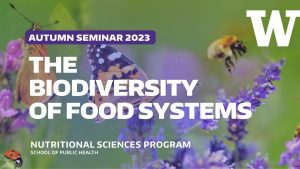
This seminar explored the biological diversity that enables sustainable food systems and healthy communities. This biodiversity, including plants, animals, fungi, and microorganisms across ecosystems, is critical to clean water, fertile soils, pollination, stable climate, and nutritional and cultural diversity. This biodiversity is also at risk of extinction, largely due to food production practices that rely on monocultures of single species over large tracts of land and water. The consequences of this transformation have led to multiple negative climate and health impacts, especially for rural and marginalized communities.
Drawing on the expertise of guest speakers throughout the quarter, this seminar will dig into topics such as traditional and biodiverse food systems, soil biology, and agroecological communities that nourish humanity. Each topic will connect with food systems more broadly, as well as opportunities for reverence and reflecting on how to live in harmony with the systems that support humanity and life on Earth.
Schedule
Autumn 2023 seminar schedule (pdf)
Recordings Available
| Date | Title |
|---|---|
| Sep 29 | Introduction to Biodiversity and Food Systems, Yona Sipos, Food Systems, Nutrition, and Health Major, Environmental and Occupational Health Sciences, School of Public Health, UW |
| Oct 6 | Tribal Community Obesity Prevention: Youth Defining Health Through Action, Derek Jennings (Quapaw/Sac & Fox), Associate Dean for Indigenous Affairs and Engagement, Bezruchka Family Endowed Professor, Health Systems and Population Health, School of Public Health, UW |
| Oct 13 | Farm to Preschool: Cultivating an Ecosystem of Change, Kelly Okumura, Farm to Preschool Program, City of Seattle |
| Oct 20 | Community Food Systems: Biodiversity, Bugs, and Well-Being, Tony Dickey, Pollinator-Plus, Washington Native Bee Society, Beacon Food Forest |
| Oct 27 | Soil Health: A Focus for Planetary Health and One Health Interventions, Eli Wheat, Program on the Environment, Food Systems, Nutrition, and Health Major, UW |
| Nov 3 | Extremism in Defense of Flavor Is No Vice, Chef Bruce Naftaly, Marmite, Le Gourmand, Sambar |
| Nov 10 | Seafood Biodiversity and Human Health*, Joey Bernhardt, Department of Integrative Biology, University of Guelph |
| Nov 17 | Agroecology and Agrobiodiversity*, Marney Isaac, Professor and Canada Research Chair, Sustainable Food & Farming Futures Cluster Co-Director, University of Toronto |
| Dec 1 | The Organic-Regenerative Foodscape: Challenges and Opportunities, Melissa Spear, Tilth Alliance, Coalition for Organic & Regenerative Agriculture (CORA) |
| Dec 8 | Growing a Biodiverse Food Systems Future, Yona Sipos, Food Systems, Nutrition, and Health Major, Environmental and Occupational Health Sciences, School of Public Health, UW |
Certifying Sustainability in the Food System – Winter 2023
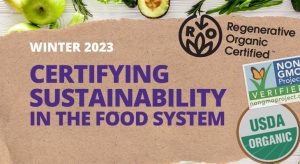
Across the food system there are sustainability challenges at each level of the supply chain with environmental, social, and economic dimensions. Over the last half century, there has been a proliferation of certifications that focus on improving the sustainability of food system practices from the production level to the consumption level. These certification programs are meant to create frameworks to measure improvements and performance, while enhancing the transparency and traceability of food system activities. In this seminar, guest speakers from prominent institutions and organizations involved in certification programs in the food system will share their experiences, expertise, and perspectives in this domain. These experts and innovators are at the forefront of addressing the sustainability of our food system via certification programs along the value chain.
Schedule
Winter 2023 seminar schedule (pdf)
Recordings Available
| Date | Title |
|---|---|
| Jan 6 | Certifying Change in the Food System: Exploring Food Certification Programs, Alissa Bilfield, UW Nutritional Sciences Program, Environmental and Occupational Health Sciences |
| Jan 13 | Mainstreaming Organics Through the USDA Certification in Washington and Beyond, Brenda Book, Washington State Department of Agriculture (video not available) |
| Jan 20 | Greening the Oceans Through Sustainable Seafood Standards, Erin Murray, Marine Stewardship Council |
| Jan 27 | Scaling the Regeneration Organic Agriculture Certification*, Elizabeth Whitlow, The Regenerative Alliance |
| Feb 3 | Certified Humane and Beyond for Animal Welfare and the Environment, Donnie Wlicox, Wilcox Family Farms |
| Feb 10 | Fairer Farms Through Fair Trade USA*, Paul Rice, Fair Trade USA |
| Feb 17 | Certifying Business as a Force for Good in the Food System*, Jessica Marquez, B Lab |
| Feb 24 | Certifying Upcycled Food*, Mariel Nunley, Upcycled Food Association |
| Mar 3 | Integrating Sustainability on Campus Through Certification, Lisa Delude, UW Office of Sustainability |
| Mar 10 | Certifying the Future of Food: Exploring the Opportunities and Challenges, Alissa Bilfield, UW Nutritional Sciences Program, Environmental and Occupational Health Sciences |
Urban Food Systems – Autumn 2022
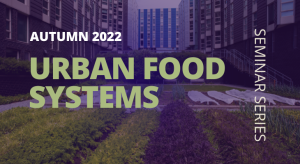
Over 80% of the US population lives in urban areas; by 2050, close to 70% of the whole world will do the same. Urban food systems can promote community health but also face many challenges.
Systemic inequities across communities, low wages for food chain workers, expensive real estate, limited city zoning, polluted soils and water, compromised growing sites, and complicated supply chains are all compounded by increasing climate disasters. Food prices are rising along with food insecurity.
So, what are the solutions? How can urban food systems instead support functional ecological systems, strong livelihoods, and just opportunities that promote food security and food sovereignty? How can the challenges be addressed and overcome to result in stronger health, sustainability, and equity outcomes?
In this seminar we dig into urban food systems, including communities, soils, agriculture, markets, and more as you engage with leaders at the forefront of addressing these challenges and opportunities.
Schedule
Autumn 2022 seminar schedule (pdf)
Recordings Available
| Date | Title |
|---|---|
| Oct 4 | Introduction to Urban Food Systems Presenter: Yona Sipos, Nutritional Sciences Program, Environmental and Occupational Health Sciences, School of Public Health, UW |
| Oct 11 | Sweetened Beverage Taxes: Economic Burdens and Benefits Presenter: Jessica Jones-Smith, Nutritional Sciences Program, Health Systems and Population Health, Epidemiology, School of Public Health, UW |
| Oct 18 | Food Access and Mutual Aid: Example of Providing Food to the Community Through Decentralized Networks Presenter: Michelle McIntosh, Advocate for Mutual Aid |
| Oct 25 | Seeking Justice, Eating Toxics: Overlooked Contaminants in Urban Community Gardens Presenter: Melanie Malone, School of Interdisciplinary Arts & Sciences, UW Bothell. Note: A recording of this presentation is not available |
| Nov 1 | Growing Food and Community in Seattle Presenters: Bela Sánchez, Solid Ground and Marra Farm |
| Nov 8 | Seeking Feedback: Presenting the UW Farm Strategic Plan Phase I Presenters: UW Farm, UW Farm Advisory Committee, and UW Botanical Garden |
| Nov 15 | Eat Local First - Healthy Food, Healthy Farms, Healthy Economies, and Healthy Communities Presenter: Sheryl Wiser, Tilth Alliance and Eat Local First |
| Nov 22 | Introduction to the Food Equity Fund Presenter: Lorna Velasco, City of Seattle Food Equity Fund |
| Nov 29 | Seattle's Food Action Plan: Developing the City's Roadmap Towards a More Sustainable, Equitable Food System Presenters: Chris Iberle and Bridget Igoe, City of Seattle Office of Sustainability & Environment Seán Walsh, City of Seattle Human Services Department |
| Dec 1 | Growing Future Cities: The Potential of Urban Food Systems Presenter: Yona Sipos, Nutritional Sciences Program, Environmental and Occupational Health Sciences, School of Public Health, UW |
Food Rescue Innovation – Winter 2022
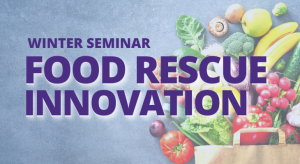 The food and agriculture organization estimates that each year, one-third of all food produced in the world for human consumption is lost or wasted. Not only does this impact global food security and climate change, but it is also evidence of the incredible economic and environmental waste within the food system. Addressing the issue of food loss and food waste has the potential to generate a “triple win”. At the economic level, reductions in food loss and waste can save money for farmers, companies, and households. Wasting less food also means we can feed more people, creating enhanced food security. And reductions in food waste can alleviate pressure on climate change through efficiencies in water, land, and energy use. Recently, there has been a modern movement around food loss and waste reduction, centered around the United Nations Sustainable Development Goal 12.3, which calls for halving the rate of food loss and waste by 2030. How can we achieve this aggressive goal? This quarter’s seminar welcomed experts and innovators from the private, public, and non-profit sectors at the forefront of addressing the real challenges of food loss and food waste at all parts of the food system, while considering creative approaches that harness collective behaviors and human motivation to catalyze change.
The food and agriculture organization estimates that each year, one-third of all food produced in the world for human consumption is lost or wasted. Not only does this impact global food security and climate change, but it is also evidence of the incredible economic and environmental waste within the food system. Addressing the issue of food loss and food waste has the potential to generate a “triple win”. At the economic level, reductions in food loss and waste can save money for farmers, companies, and households. Wasting less food also means we can feed more people, creating enhanced food security. And reductions in food waste can alleviate pressure on climate change through efficiencies in water, land, and energy use. Recently, there has been a modern movement around food loss and waste reduction, centered around the United Nations Sustainable Development Goal 12.3, which calls for halving the rate of food loss and waste by 2030. How can we achieve this aggressive goal? This quarter’s seminar welcomed experts and innovators from the private, public, and non-profit sectors at the forefront of addressing the real challenges of food loss and food waste at all parts of the food system, while considering creative approaches that harness collective behaviors and human motivation to catalyze change.
Schedule
Winter 2022 seminar schedule (pdf)
Recordings Available
| Date | Title |
|---|---|
| Jan 7 | Framing Food Rescue Presenter: Alissa Bilfield, Assistant Professor, Nutritional Sciences Program and Environmental & Occupational Health Sciences, School of Public Health, UW |
| Jan 14 | Reducing Food Loss and Waste Presenter: Brian Lipinski, World Resources Institute |
| Jan 21 | Partnering with Farms to Rescue Ugly Food: Insights from Field to Fork Presenter: Maddy Rotman, Head of Sustainability, Imperfect Foods |
| Jan 28 | Big Data and Big Grocery: Streamlining Supply Chains to Reduce Food Loss Presenter: Stefan Kalb, CEO and Co-Founder of Shelf Engine |
| Feb 4 | Certifying Upcycled Food Presenter: Daniel Kurzrock, CEO of ReGrained and Co-founder Upcycled Food Association |
| Feb 11 | Creating Collaborative Action for Food Rescue Innovation Presenter: Liz Fikejs, Seattle Public Utilities |
| Feb 18 | Pedaling Relief: Activating Volunteers to Address Food Insecurity & Food Waste Presenter: Alissa Bilfied discusses Maxwell Burton's work with Cascadia Bicycle Club |
| Feb 25 | Capturing Energy from Food Waste to Address Climate Change Presenters: Michael Smith and Peyton Ridland, Impact Bioenergy |
| Mar 4 | Designing Innovations Around Food Rescue and Food Waste Presenter: Lauren Brohawn, Arthur W. Buerk Center for Entrepreneurship, UW |
Future of Food Systems – Autumn 2021
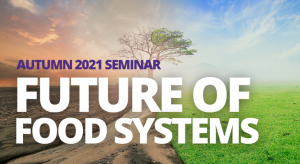 There is growing urgency for our food systems to be more sustainable, resilient, and equitable. But how? Food systems are too-often implicated in perpetuating health inequities, climate chaos, and diminishing biodiversity. Competing solutions to these challenges are being considered locally and globally, across often-complicated supply chains and impacted by various public health, social, ecological, and economic drivers. Should farms and food systems feed regional or international communities; should they be large or small, uniform or diverse? What are the outcomes for our climate, human and ecological health, justice and equity? Which technologies and processes of engagement should be prioritized? While solutions may not be binary, choices must be made to nourish a growing human population on a finite Earth. This quarter;s seminar welcomed experts and practitioners who are at the forefront of addressing these challenges and considering different possibilities for the future of food systems.
There is growing urgency for our food systems to be more sustainable, resilient, and equitable. But how? Food systems are too-often implicated in perpetuating health inequities, climate chaos, and diminishing biodiversity. Competing solutions to these challenges are being considered locally and globally, across often-complicated supply chains and impacted by various public health, social, ecological, and economic drivers. Should farms and food systems feed regional or international communities; should they be large or small, uniform or diverse? What are the outcomes for our climate, human and ecological health, justice and equity? Which technologies and processes of engagement should be prioritized? While solutions may not be binary, choices must be made to nourish a growing human population on a finite Earth. This quarter;s seminar welcomed experts and practitioners who are at the forefront of addressing these challenges and considering different possibilities for the future of food systems.
Schedule
Recordings Available
| Date | Title |
|---|---|
| Oct 5 | Framing Future Food Systems Yona Sipos, Assistant Teaching Professor, Nutritional Sciences Program and Environmental & Occupational Health Sciences, School of Public Health, University of Washington |
| Oct 12 | Learning from Traditional Ecological Knowledge to Grow Future Food Systems Polly Olsen (Yakama Nation) Tribal Liason, Burke Museum, University of Washington |
| Oct 19 | Unpacking the Dialogue on Sustainable Diets: Evidence, Translation, and Action Marie Spiker, Assistant Professor, Nutritional Sciences Program and Epidemiology, School of Public Health, University of Washington |
| Oct 26 | Ariel Bangs, Chef and Executive Director, Plant Based Food Share |
| Nov 2 | What's at Stake with the Right to Food Michael Fakhri, UN Special Rapporteur on the Right to Food |
| Nov 9 | Irrigation Water Quality in Agricultural Production Systems Karen Levy, Associate Professor, Environmental & Occupational Health Sciences, School of Public Health, University of Washington |
| Nov 16 | Assessing Washington State Food Systems During COVID-19 Associate Professor Jennifer Otten and Assistant Professor Sarah Collier, Nutritional Sciences Program and Environmental & Occupational Health Sciences, School of Public Health, University of Washington |
| Nov 23 | Indigenous Food Sovereignty: Challenges and Successes Devon Mihesuah (Choctaw Nation) and Cora Lee Beers Price Teaching Professor in International Cultural Understanding, Humanities Program, University of Kansas |
| Nov 30 | Carbon across biomes: Agricultural applications for PNW resilience Eli Wheat, Lecturer, Nutritional Sciences Program and Program on the Environment, University of Washington |
| Dec 7 | The Future is Now Yona Sipos, Assistant Teaching Professor, Nutritional Sciences Program and Environmental & Occupational Health Sciences, School of Public Health, University of Washington |
Food Supply Chains During the COVID-19 Pandemic – Winter 2021
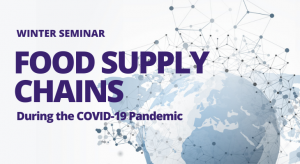 As the COVID-19 pandemic emerged in early 2020, images of dumped milk and plowed-under crops, empty grocery store shelves, and lengthy food bank lines shocked the nation. While there are no nationwide shortages of food, inventory and availability of various staples have been affected, and food prices and food insecurity are on the rise, especially impacting Black, Indigenous, and People of Color (BIPOC) communities. Many food system laborers are from BIPOC communities and continue to be adversely affected as farmworkers, meat plant workers, and long distance truckers face compromised work environments. The food service industry has been crippled, and food packaging and distribution has shifted to accommodate household servings instead of restaurant and bulk orders.
As the COVID-19 pandemic emerged in early 2020, images of dumped milk and plowed-under crops, empty grocery store shelves, and lengthy food bank lines shocked the nation. While there are no nationwide shortages of food, inventory and availability of various staples have been affected, and food prices and food insecurity are on the rise, especially impacting Black, Indigenous, and People of Color (BIPOC) communities. Many food system laborers are from BIPOC communities and continue to be adversely affected as farmworkers, meat plant workers, and long distance truckers face compromised work environments. The food service industry has been crippled, and food packaging and distribution has shifted to accommodate household servings instead of restaurant and bulk orders.
“Food supply chains” have now become part of everyday conversations as the stress of the pandemic raises questions about the sustainability, resilience, and inequities of our food system. Food supply chains include the sectors and labor supporting food production, processing, transportation, distribution, and access. Linear representations of supply chains often belie the extended, complicated realities of interconnected national and global food systems. As food supply chains continue to be impacted by COVID-19 among other global challenges, it is essential to learn about opportunities to increase sustainability, resilience, and equity. Applying a systems perspective to these questions were the focus of this quarter’s seminar and discussion.
Schedule
Recordings Available
| Date | Title |
|---|---|
| Jan 8 | Introduction to Food Systems During COVID-19 Yona Sipos, Assistant Teaching Professor, Nutritional Sciences Program and Environmental & Occupational Health Sciences, Core Faculty for Food Systems, Nutrition, and Health, UW |
| Jan 15 | Food Supply Management: A Technological Approach and COVID-19 impact Joe Heim, Health Services and Industrial & Systems Engineering, UW; Christina Mastrangelo, Industrial & Systems Engineering and Center for Healthcare Organization Transformation, UW |
| Jan 22 | The Power of Local Food Systems - Why You Should Buy Better Eggs Donnie Wilcox, Supply Chain Manager, Wilcox Family Farms Inc. |
| Jan 29 | Resource Mobilization Advocacy for Global Food Systems, Nutrition, and Health Shelby Wilson, Consultant |
| Feb 5 | Impacts to the Potato Supply Chain Due to COVID-19: Insights from the WA State Potato Commission Chris Voigt, Excecutive Director, WA State Potato Commission |
| Feb 12 | From Canned Goods to TP: Managing Grocery Supply Chains Under the Strain of COVID-19 Senior Grocery Buyer Scott Owen, PCC Community Markets |
| Feb 19 | COVID-19 Food Access Among American Indian/Alaska Native Tribes in WA State: The Value of Food Sovereignty Speakers from the Northwest Tribal Epidemiology Center, Northwest Portand Area Indian Health Board (NPAIHB): Victoria Warren-Mears, Director and Nora Frank-Buckner, Food Sovereignty Initiatives Director |
| Feb 26 | Insights from the Washington Food Policy Forum Laura Raymond, WSDA Regional Markets Program Manager, Small Farm Direct Marketing Assistance and Farm to School |
| Mar 5 | Findings from the Washington State Farm Resilience Survey: Impacts and Adaptations During COVID-19 Anna Fogel, MPH and GCPD student in the Nutritional Sciences Program at UW, and Sarah Collier, Assistant Professor, Nutritional Sciences Program and Environmental & Occupational Health Sciences, Core Faculty for Food Systems, Nutrition, and Health, UW |
Growing Resilience and Equity: Food Systems Amid the Dual Pandemics of COVID-19 and Systemic Racism – Autumn 2020
The dual pandemics of COVID-19 and systemic racism are illuminating health equity, food equity, and structural vulnerabilities across the food system. COVID-19 impacts have amplified the inherent racial and economic inequities of our globalized and industrialized food supply chains. The lowest paid and most vulnerable workers have either been laid off or deemed essential and subject to unsafe working conditions; viral outbreaks continue to spread amongst farm workers and meat processing workers; market channels are disrupted; and food insecurity is rising alongside food waste. These challenges disproportionately impact Black, Indigenous, and People of Color (BIPOC) communities, who are already most affected by environmental and climate injustices. This quarter’s seminar showcased researchers and organizers working at the confluence of these crises for positive and impactful change. Sessions highlight challenges as well as transformation, hope, and potential for resilience and equity to take root across the food system.
Schedule
Recordings Available
- Growing a More Sustainable, Equitable Future for Communities of Color: The Black Farmer’s Collective and Yes Farm – November 10, 2020. Director Ray Williams and Program Manager Hannah Wilson from Yes Farm with the Black Farmers Collective
- Why Voting Matters to Food Systems – November 3, 2020. Navina Khanna, Director of HEAL Food Alliance
- Codeveloping Culturally Relevant Messages for Farmworker Safety and Health in the COVID-19 Pandemic Project – Presented October 27, 2020. Elizabeth Torres, Research and Project Coordinator for El Proyecto Bienestar (EPB) and Research Coordinator, Northwest Communities Education Center/Radio KDNA, and PNASH, UW
- Examining the Impact of COVID-19 Pandemic on Food Systems, Food Security, and Food Access in Washington State – October 20, 2020. Adam Drewnowski, Professor of Epidemiology and Director of Nutritional Sciences Program and Center for Public Health Nutrition, UW
- Food Systems Shock and Stresses and the Need for Food Systems Analysts: the IFSTAL Response – October 13, 2020. John Ingram, Leader of Interdisciplinary Food Systems Teaching & Learning (IFSTAL) and Associate Professor, Environmental Change Institute, University of Oxford
- Intersections of Racial Equity and Food System Resilience – October 6, 2020. Yona Sipos, Assistant Teaching Professor, Nutritional Sciences Program and Environmental & Occupational Health Sciences, Core Faculty for Food Systems, Nutrition, and Health, UW
Food Systems in the Age of Climate Change- Winter 2020
Every aspect of the food system is impacted by and has an impact on climate. Greenhouse gas emissions and contributions to climate instability or resilience are determined by what we eat, how that food is produced and harvested, how far it travels, and whether the food is wasted or resources are recovered. Climate change impacts which foods will grow and be available, their nutritional outcomes, and the occupational health of front-line agricultural workers. This quarter’s seminar welcomed local and regional experts to explore such climate impacts in the context of the Pacific Northwest, alongside the quest for climate justice and food system resilience.
Printable Schedule
Recorded Sessions
- Food on Campus: UW Sustainability Plans and Initiatives – on March 3, 2020. Project and Purchasing Specialist Casey Crane and Assistant Director for Residential Life Clive Pursehouse, UW.
- Closing the Loop: Regenerative Animal Agriculture and Meat – February 25, 2020. Nicole Witham, the statewide coordinator for the WSU Food Systems Program (moderator); Matthew Cox from Green Bow Farm in Ellensburg, WA; Mericos Rhodes from Spoon Full Farm in Thorp, WA; David Haakensen from Jubilee Farm in Carnation, WA
- Growing for Change: Agricultural Adaptions for Urban to Rural Systems – February 18, 2020. David Montgomery, Earth and Space Sciences, UW; Julie Johnson, Landscape Architecture, UW; and Yolimar Rivera Vazquez, Food & Farms Coordinator, Ecotrust
- Labor & Climate: Climate-Related Occupational Impacts on Agricultural Workers – February 4, 2020. Maria Blancas, PNASH Center and Environmental & Forest Sciences at UW.
- From the Ground Up: Climate Impacts of and on our Soils – January 21, 2020. Sarah Collier, Environmental and Occupational Health Sciences, Nutritional Sciences Program, UW; Brittany Johnson, College of the Environment.
- Oceans and Cliate: Understanding Impacts on Aquatic Food Systems – Presented January 15, 2020. Jan Newton, Applied Physics Laboratory, Washington Ocean Acidification Center, UW
- PNW Food Systems in the Age of Climate Change: Mitigation, Adaptation, and Resilience. Presented January 7, 2020. Jeremy Hess, Environmental & Occupational Health Sciences, Global Health, Emergency Medicine, CHanGE, UW
- Autumn 2019 – Food Justice: Intersections of Identity & Place
- Winter 2019 – Aquatic Food Systems, Nutrition, and Health
- Autumn 2018 – Cultivating Sustainable Food Systems to Improve Nutrition, Health, and Equity
- Winter 2018 – Aligning Food Systems with Nutrition and Health
- Autumn 2017 – Water, Food, and Nutrition Security
- Winter 2017 – Food Equity and Population Health
- Autumn 2016 – Feeding Nine Billion: Climate, Nutrition, and Population Health
- Winter 2016 – Food Entrepreneurs
- Autumn 2015 – Food, Culture, and Society
- Winter 2015 – Global Nutrition and Food Justice
- Autumn 2014 – Sustainable Food and Nutrition Security
- Winter 2014 – Marketing Food, Nutrition, and Health
Subscribe to our presentations listserv to receive announcements about upcoming Nutritional Sciences Program seminars, student thesis and dissertation presentations, and other program events. Get details
